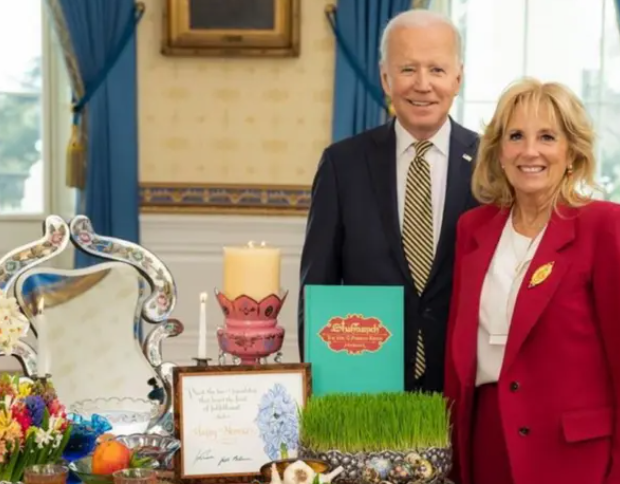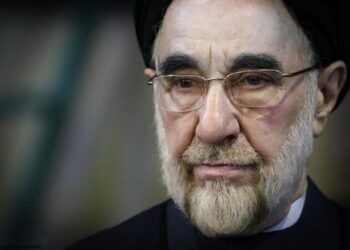March 25, 2022

White House Haft Seen table on Now Ruz. The White House has sometimes put up Haft Seen tables in the past, but this is the first time any president has posed beside one.
The fact that this is the third year Khamenehi has made this the center of his focus makes clear that he is not satisfied that enough has been achieved.
In his annual Now Ruz address, Khamenehi also named four “sweet” successes for the revolution and one “bitter” development in the year just ended, 1400.
The most bitter issue last year was “high prices, inflation and the like,” he said, although inflation fell substantially from its high point. It was curious that he did not boast about how much the inflation rate has fallen, like others in the regime.
As for the four “sweat” successes, he listed them as:
- Confronting the coronavirus epidemic;
- Scientific and technological progress, of which he cited two “launching satellites,” recognizing that a dozen days earlier Iran successfully put into orbit its first working satellite since February 2015, and the “domestic production of different [covid] vaccines, some of which have received certification globally.” However, while the World Health Organization is reviewing Iran’s application that it approve an Iranian vaccine for global use, WHO has not certified any Iranian vaccine for use yet;
- The presidential elections, which Khamenehi mentioned without acknowledging that turnout was the lowest in the four decades of the Islamic Republic; and
- The admission by the United States that it “suffered a humiliating defeat of their maximum pressure policy against Iran. The term ‘humiliating’ was a term they themselves used…. The Iranian people were victorious. The Iranian people won.” The Biden Administration has said the Trump Administration policy of pressuring Iran by leaving the nuclear agreement was a failure because it did not achieve its goal of forcing Iran to sign a new agreement with fewer benefits for Iran, but the Biden Administration did not say Iran won or that the United States was “humiliated.”
In Washington, President Biden and First Lady Jill Biden posed beside a Haft Seen table set up in the White House. The Bidens issued a Now Ruz message, which White Houses started to do during the administration of Bill Clinton. Some news reports said this year’s message never mentioned Iran or Iranians. Actually, it mentioned Iran in the very first sentence. But the message was entirely a holiday greeting, and did not make any political comments as previous presidents have.
The national traffic police announced that, over the 10-day period of March17-26, a total of 486 people died in traffic accidents, emphasizing how deadly the holiday is. However, that was 48.6 deaths a day, which really wasn’t that much different from the 43.6 deaths per day for all of the year 1395 (2016-17)
At least 19 people died and 2,800 were injured celebrating Chaharshanbeh Suri, the celebration of the annual fire festival ahead of Now Ruz.
More than 30 of the injured were hospitalized in critical condition, 171 had lost a limb, 880 suffered eye injuries, and 850 suffered from burns, the spokesman for national emergency services, Mojtaba Khaledi, said March 16.
Homemade fireworks and improvised explosives, authorities have said, are the main cause of casualties, although most people only leap over bonfires and shoot off small fireworks.
Hossain Rahimi, the Tehran chief police, said that even before most celebrations had begun, more than 50 people had been arrested in the capital.
Police usually arrest people who celebrate Chaharshanbeh Suri with dancing as the national tradition is frowned upon by Islamic hardliners who see it as a pagan relic.
Literally translated as festive or scarlet Wednesday, Chaharshanbeh Suri, whose roots go back beyond ancient Zoroastrianism, is a prelude to the Now Ruz holidays and is marked on the eve of the last Wednesday of the final Iranian month.
Meanwhile in Afghanistan, the new Taliban government has disestablished Now Ruz as a holiday. Afghanistan is the only country other than Iran to use the Persian solar calendar. But this year, New Year’s Day in Afghanistan was a workday like any other. Universities made the first day of the new year a test day as well. The Taliban said people were free to celebrate the day if they wished—but decreed that the holiday was not in keeping with Islamic law.















